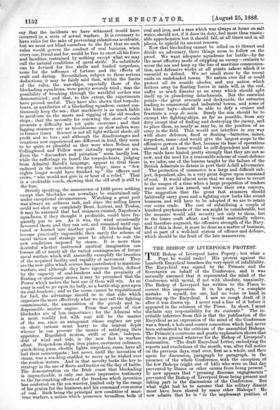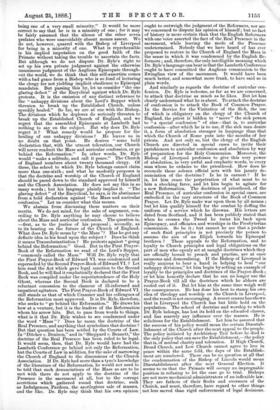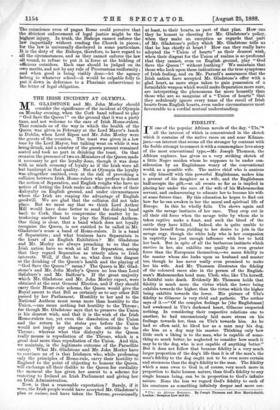THE BISHOP OF LIVERPOOL'S PROTEST.
Bishop of Liverpool hates Popery ; but what a Pope he would make ! His protest against the Lambeth Encyclical breathes the very spirit of infallibility. The Encyclical was signed by the Primate and the Secretaries on behalf of the Conference, and it was naturally assumed that it represented the mind of the Conference with moral, if not with 'absolute, unanimity. The Bishop of Liverpool has written to the Times to correct this impression. It is, he says, "a complete mistake. I myself, for one, had no voice or hand in drawing up the Encyclical. I saw no rough draft of it after it was drawn up. I never read a line of it before it appeared in the columns of the Times. In short, I must disclaim any responsibility for its contents." The in- evitable inference from this is that the publication of the Encyclical as an expression of the mind of the Conference was a fraud, a hole-and-corner concoction which had never been submitted to the criticism of the assembled Bishops. The Primate's courteous and gentle explanation shows that there is no ground whatever for the Bishop of Liverpool's insinuation. "The draft Encyclical Letter, embodying the reports and resolutions of the Month, was, after full notice on the previous days, read over, first as a whole, and then again for discussion, paragraph by paragraph, in the presence of the whole Conference, with the exception of the few Bishops (eight -out of 145) who were on that day prevented by illness or other causes from being present.' It now appears that "pressing diocesan engagements" prevented the Bishop of Liverpool from being present and taking part in the discussions of the Conference. But what right had he to assume that his solitary dissent must have been shared by many other Bishops ? He now admits that he is "in the unpleasant position of mandates. But passing this by, let us consider " the one And similarly as regards the doctrine of auricular con- glaring defect " of the Encyclical against which Dr. Ryle fession. Dr. Ryle is welcome, as far as we are concerned, protests. It is the omission of any distinct reference to to attack that doctrine as much as he likes. But let him the " unhappy divisions about the Lord's Supper which clearly understand what he is about. To attack the doctrine threaten to break up the Established Church, unless of confession is to atta,ck the Book of Common Prayer. speedily healed." So far, we are at one with the Bishop.. In the Service for the Visitation of the Sick, the use The divisions which he deplores do seriously threaten to of which is obligatory on the clergy of the Church of break up the Established Church of England, and we England, the priest is bidden to " move " the sick person regret that the assembled Episcopate at Lambeth had to "a special confession" of sins—that is, to auricular nothing to say on the subject. But why does Dr. Ryle confession—after which he is to use, if the sick man desire regret it ? What remedy would he propose for the it, a form of absolution stronger in language than that healing of our unhappy divisions ? He leaves us in which the Church of Rome puts into the mouths of her no doubt on that point. He desires "some bold priests. And not only so, but the clergy of the English declaration that, with the utmost toleration, our Church Church are directed in special cases to invite their will never readmit the Mass and auricular confession, or go parishioners to auricular confession and absolution by way behind the Reformation." In other words, Dr. Ryle of preparation for the Holy Communion. Moreover, the would "make a solitude, and call it peace." The Church Bishop of Liverpool professes to give this very power of England numbers about twenty thousand clergy. Of of absolution, in very awful and emphatic words, to every these, the school to which Dr. Ryle belongs cannot claim man whom he ordains to the priesthood. How does he more than one-sixth ; and what he modestly proposes is reconcile these solemn official acts with his jaunty de- that the doctrine and worship of the Church of England nunciation of the doctrine ? Is he in earnest ? If he should be pared down to the standard approved by himself is, let him cease the perpetration of what must be to and. the Church Association. He does not say this in so him a shocking farce, and let him begin to agitate for many words ; but his language plainly implies it. "The a new Reformation. The doctrines of priesthood, of the glaring defect" of the Encyclical, he says, is its abstinence Real Presence, of auricular confession in special cases, are from a bold declaration against "the Mass and auricular embodied in the very structure of the Book of Common confession." Let us consider what this means. - Prayer. Let Dr. Ryle make war upon them by all means ; We abstain from discussing these matters on their but let him qualify himself for the combat by doffing the merits. We do not mind, for the sake of argument, con- uniform of a service which he disowns. His letters are ceding to Dr. Kyle anything he may choose to believe dated from Scotland, and it has been publicly stated that. about the Mass and auricular confession. The question is, when he crosses the Tweed he turns his back upon —first, as to the justice of his proposal ; secondly, as Episcopacy, and officiates and worships in the Presbyterian. to its bearing on the future of the Church of England. communion. So be it ; but cannot he see that a prelate What does Dr. Ryle mean by" the Mass "? Has he got any of such fluid principles is not precisely the person to definite idea in his head upon the subject ? Does he think assume the airs of an Elijah towards his Episcopal' it means Transubstantiation ? He protests against "going brethren ? These appeals to the Reformation, and to, behind the Reformation." Good. But in the First Prayer- loyalty to Church principles and legal obligations on the Book of the Reformation we read of the Lord's Supper, part of men who openly set at naught doctrines which they "commonly called the Mass." Will Dr. Kyle reply that are officially bound to preach and practise, are at once the First Prayer-Book of Edward VI. was condemned and nauseous and demoralising. If the Bishop of Liverpool is superseded by the Second Prayer-Book of Edward VI.? Let really anxious to. bear a hand in helping to heal "our • him read the Act which gave legal sanction to the Second unhappy divisions," let him begin by setting an example of Book, and he will find it emphatically declared that the First loyalty to the principles and doctrines of the Prayer-Book ; Book was compiled under the superintendence of the Holy or let him honestly declare that he can no longer use the Ghost, whereas the Second Book is declared to be a Prayer-Book till all the doctrines which he abhors are reluctant concession to the clamour of ill-informed and rooted out of it. But let him at the same time weigh well impatient agitators. The First Prayer-Book of Edward VI. the consequences. He has done his best to stamp his own still stands as that of which Crammer and his colleagues of idea of theology and worship on the Church in Liverpool, the Reformation most approved. It is Dr. Kyle, therefore, and the result is not encouraging. A recent census has shown who seeks to "go behind the Reformation." He draws his that in Liverpool the Church has but little hold on the bow at a venture, but it is the leaders of the Reformation population. The school of doctrine and worship to which whom his arrow hits. But, to pass from words to things, Dr. Ryle belongs, has lost its hold on the educated classes, what is it that Dr. Kyle wishes to see condemned under and has scarcely any influence over the masses. He is the word " Mass " ? Does he mean the doctrine of the solicitous for the Establishment. Let him be assured that Real Presence, and anything that symbolises that doctrine ? the success of his policy would mean the certain Disestab- But that question has been settled by the Courts of Law. lishment of the Church after the next appeal to the people. In "Ditcher v. Denison," and in "Sheppard v. Bennett," the The policy initiated by Archbishop Tait before he died is doctrine of the Real Presence has been ruled to be legal. the only policy that can save the Establishment, —the policy It would seem, then, that Dr. Ryle would have had the that is, of mutual charity and toleration. If High Church, Lambeth Conference go behind not only the Reformation, Broad Church, and Low Church cannot agree to live in but the Courts of Law in addition, for the sake of narrowing peace within the same fold, the days of the Establish– the Church of England to the dimensions of the Church ment are numbered. There can be no question at all that Association. If Dr. Kyle had more than a tyro's knowledge the condemnation of the Bishop of Lincoln would mean of the literature of the Reformation, he would not need to Disestablishment after the next General Election. It be told that such denunciations of the Mass as are to be seems to us that the Primate will occupy an impregnable met with there do not apply to the doctrine of the position in refusing to let the case go to trial. Bishops Presence in the sacrament at all, but to the corrupt are not mere mechanical administrators of an inflexible law. accretions which gathered round that doctrine, such They are fathers of their flocks and overseers of the as Indulgences, Pardons, the sacrilegious sale of masses, Church, and must, therefore, have regard to other things. and the like. Dr. Ryle may think that his own opinion not less sacred than rigid enforcement of legal decisions. being one of a very small minority." It would be more ought to outweigh the judgment of the Reformers, nor are correct to say that he is in a minority of one ; for it may we concerned to dispute his opinion of himself ; but no fact be fairly assumed that the silence of the other seven of history is more certain than that the English Reformers prelates who were unavoidably absent means assent. We with one voice asserted the fact of the Real Presence in the do not, however, quarrel with the Bishop of Liverpool sacrament, while leaving the mode of the Presence for being in a minority of one. What is reprehensible undetermined. Nobody that we have heard of has ever is his implied imputation on the good faith of the proposed to restore in the Church of England the Mass in Primate without taking the trouble to ascertain the facts. the sense in which it was condemned by the English Re.. Butalthough we do not dispute Dr. Ryle's right to formers ; and, therefore, the only intelligible meaning which set up his own private judgment against the otherwise Dr. Kyle's language can bear is that the Lambeth Conference unanimous judgment of the Anglican Episcopate through- ought to have committed the Anglican communion to the out the world, we do think that this self-assertion comes Zwinglian view of the sacrament. It would have been with a bad grace from a Bishop who is so fond of lecturing much better, and somewhat more frank, to have said so in the clergy for not yielding implicit obedience to Episcopal plain words. The conscience even of pagan Rome could perceive that the strictest enforcement of legal justice might be the highest injury. In truth, the Bishops cannot enforce the law impartially without rending the Church in pieces ; for the law is universally disobeyed in some particulars. It is the duty of the Bishops, therefore, to have regard to • all the circumstances, and as they cannot enforce the law all round, to refuse t:lac,,Tit it in force at the bidding of i officious outsiders. ease should be judged on its own merits, and not by any rule of Procrustean uniformity; and when good is being visibly done—let the agency belong to whatever school—it would be culpable folly to put it down in deference to a Pharisaic subservience to the letter of legal obligation.




































 Previous page
Previous page